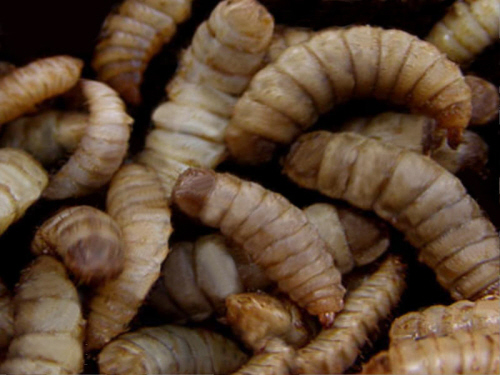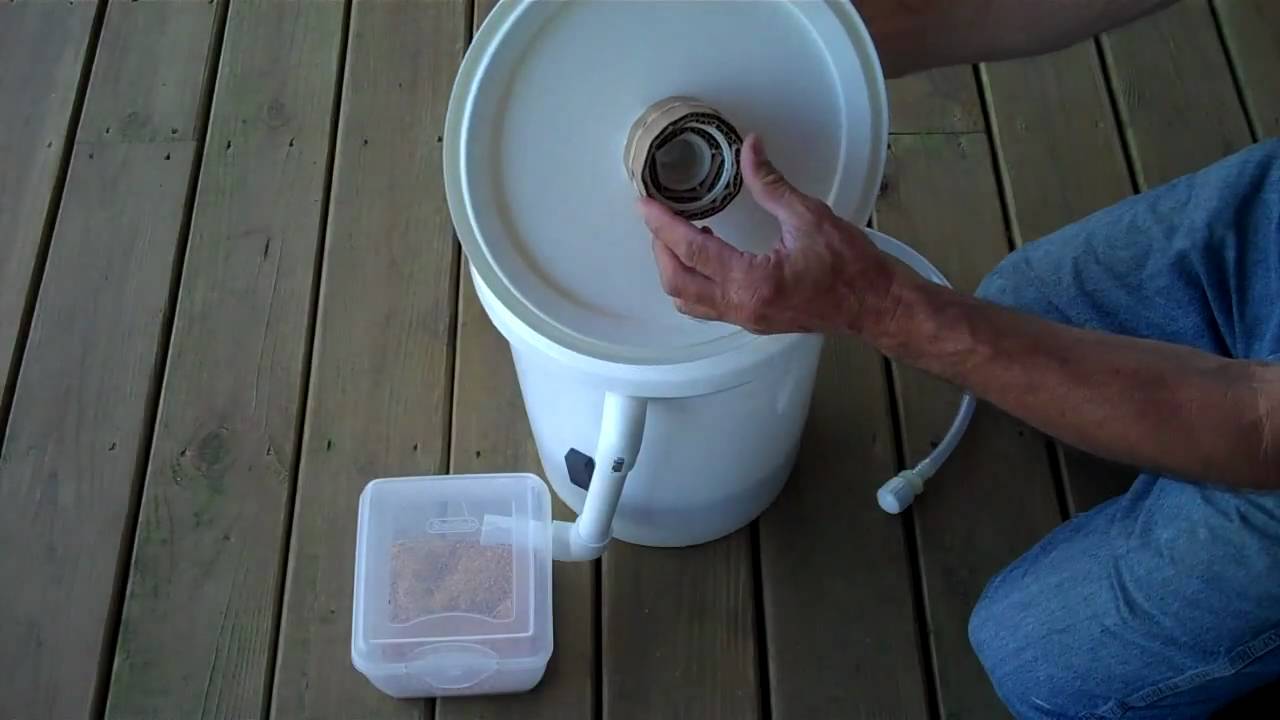
I’m not a know-it-all (at least I like to think that), but when it comes to composting methods, I was pretty sure I had them all down: from typical bins and piles, to worm composting, to bokashi. This morning, Sami Grover at Treehugger proved me wrong: I’d never heard of composting food scraps with black soldier fly larvae.
Fly larvae? Yeah… sounds gross, right? That’s just one of the questions I had… and I started digging into the topic immediately. Rather than research and then pull it all together in a post, I’m going to deal with the questions and findings as I come across them… if you know more about composting with black soldier fly larvae, share your knowledge with us.
Why on earth would you want to do this?
It turns out that if you’re composting with a pile or bin, you already are: according to Oregon State University’s Extension Service, those big maggots you come across in your compost may well be soldier fly larvae. And they’re helpful in the process of breaking down the materials that go into your bin. So, composting specifically with these larvae is just a variation on a process already going on in your composting efforts.
What can you compost with soldier fly larvae?
These larvae go after nitrogen-rich materials, so they’re particularly good with kitchen scraps. One of the advantages of composting food wastes this way vs. more traditional methods: you can add meat and dairy scraps to the mix.
Doesn’t this pose health problems? Flies carry disease, right?
Some flies certainly do, but not black solider flies. Only the larvae feed (the adults don’t have mouths), so no regurgitation, and no biting.
Do you need special equipment for this kind of composting?
Looks like it if you’re going to do this with your food scraps. There are commercially available fly larvae composters; there are also DIY plans (the main subject of Sami’s post). He pointed to a plan from the Black Soldier Fly Blog, which looks to be one of the best overall resources on this practice. Here’s the first part of the video series on building your own composting unit:
Does this produce the same kind of compost as other processes?
As far as I can tell, yes… use it your garden, with your house plants, etc. Additionally, you’ll end up with more larvae than can survive on whatever amount of organic waste you put into the system, and you can capture and feed these excess grubs to chickens or fish in an aquaponics system.
Does it smell?
Always a big question with any composting effort. The short answer: yes, but it only smells badly if you’re not doing it right.
My wife wasn’t crazy about the worm bin when I had that going… I’m guessing she really wouldn’t like this idea. But it looks like a great way to deal with kitchen scraps… and, according to a least one article on the Black Solider Fly Blog, this form of composting even has climate benefits (though I’ve yet to find out anything about the author’s credentials).
Do you do this? How’s it working out? And, if you don’t, or have never heard of it, are you as intrigued as I was when I ran across it?
Image credit: Dennis Kress at Wikimedia Commons


Mary
Hello! After only about 4 weeks of composting in a homemade tumbler-type composter (55 gallon food-grade barrel that I spraypainted black and drilled 1/2″ holes in, then skewered onto a stainless steel rod mounted on sawhorses), I discovered black soldier fly larvae in my compost today. I live in central FL.
So now I am doing a little experiment: I’ve got several of the larvae in a glass jar with a mesh/rubber band top, alongside a bit of compost and a basil leaf, a slice of lemon, and a fresh cat poop from the cat box. Imagine if the BSF larvae like to eat the cat poop! I’d be in heaven.
Will post my results in a week or so.
Felix
I have literally thousands of BSF larvae in my compost bin. There’s NOTHING these guys won’t eat. I’ve thrown everything from grass clippings to raw beef at these little wonders. They eat it all with a couple of hours. They even eat large peices of cardboard which i use to ceber them, as they really don’t like light. The compost that I get is fantastic! It doesn’t smell and my garden loves it!
These guys put off a lot of heat and you can actually hear them chewing. My kids love to feed their “pet worms” with their leftovers, so these little beasties have helped me with getting them to clear the table.
Overall, I think that if you’re lucky enough to have these little guys in your bin, you need to nurture them so that you can have the fastest biomass breakdown you’ve ever seen.
ppierce
I use Black soldier flies in compost pits. As the land I live on is rock and clay to plant fruit trees I dig a series of compost holes and cover with a heavy wooden cover. The soldier fly larvae breaks down garden and kitchen waste in the holes and when they are full I leave them until the waste is turned into castings. This has enabled me to grow productive fruit trees in an area that would otherwise not produce. Composting like this has increased root penetration and the water holding capacity of the soil as well as the fertility. Because soldier flies are free and self manage the only other contribution I make is a circle of wire placed on the ground around the holes to ensure that the flies can pupate without all being eaten by poultry.
Ken Farley
I usually have lots of black soldier fly larvae in my compost bins but none this year. Does anyone know what happened this year? central fl. ormond beach. I saw a few flies but that is it.
Greg
I made a trash can composting bin five months ago (July). Black fly larvae showed up in just a few weeks. I did some research and discovered these incredible larvae. They performed just as I have read online. During the middle of November the weather turned cold (34-45) at might for several days. I am 30 miles north of the Florida border in South Georgia. I read that larvae would be ok at this temperature for a short period of time. However, they are all gone. Can anyone advise how to winterize for black fly larvae? Since they originally found me, how do you recommend restarting a colony?
Jeff McIntire-Strasburg
Greg – I don’t know the answers to you questions, but the Black Soldier Fly Blog is a great source of information on this topic – I wouldn’t be surprised if your questions are answered there: http://blacksoldierflyblog.com/
daisy dorset
I just ran screaming away from my compost heap (free standing at the end of the garden) to google big maggots and found this. Thank goodness and thank you! I think I’ll go and feed them some more.
Jeff McIntire-Strasburg
I’m glad we could be of help, Daisy! Yeah, bugs of all kinds will end up in a compost pile/heap; for the most part, they help the process along…
Rosemary
Me too!